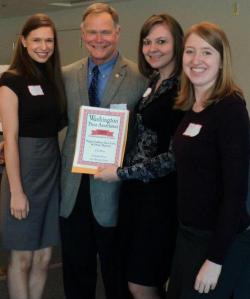I’m proud to announce that I have won two awards from the Washington Press Association:
- First place, Editorial/commentary — Gina Cole, Paige Collins, Olena Rypich; The Western Front — “College is not a practice run: Censorship of student publications is still censorship”
- Second place, Feature — Gina Cole; Klipsun Magazine — “A break as a fix”
Entries from Western Washington University students won in many other categories, including breaking news, personality profile, social issues/minority affairs reporting, environmental reporting, and even ad design.

With Olena and Paige, collecting our first-place award for editorial/commentary from the Washington Press Association. I'm on the far left.
This just adds to my utter joy at all the Mark of Excellence Awards that Western students collected a few weeks ago from the Society of Professional Journalists — a school-record 22 awards in all, including Best All-Around Non-Daily Newspaper for The Western Front. To earn that honor (largely for issues from when I was editor-in-chief) is just mind-blowing. On to nationals!
I am, as always, incredibly proud of my classmates and my alma mater.